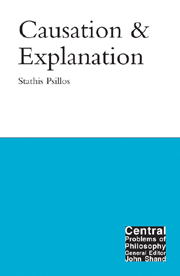11 - The metaphysics of explanation
from III - Explanation
Summary
It's about time to tackle an important issue that lies behind the debate around the nature of explanation. It is, I think, the basic metaphysical issue: what comes first, explanation or causation? Kitcher's and Salmon's general views will be the focal point of this chapter.
“Bottom-up” vs “top-down”
Salmon has made a distinction between three broad approaches to the nature of explanation. He has called them the “epistemic conception”, the “modal conception” and the “ontic conception”.
The epistemic conception is the Hempelian conception. It makes the concept of explanation broadly epistemic, since it takes explanation to be, ultimately, nomic expectability. The modal conception differs from the epistemic mostly in its account of necessity. The explanandum is said to follow necessarily from the explanans, in the sense that it was not possible for it not to occur, given the relevant laws. Von Wright (1971: 13) put the point thus: “What makes a deductive-nomological explanation ‘explain’ is, one might say, that it tells us why E had to be (occur), why E was necessary once the basis [body of explanatory facts] is there and the laws are accepted.”
The ontic conception, the one advocated by Salmon (1984), takes explanation to be intimately linked to causation. As he (1984: 19) explains: “To give scientific explanations is to show how events … fit into the causal structure of the world.”
- Type
- Chapter
- Information
- Causation and Explanation , pp. 281 - 294Publisher: Acumen PublishingPrint publication year: 2002

